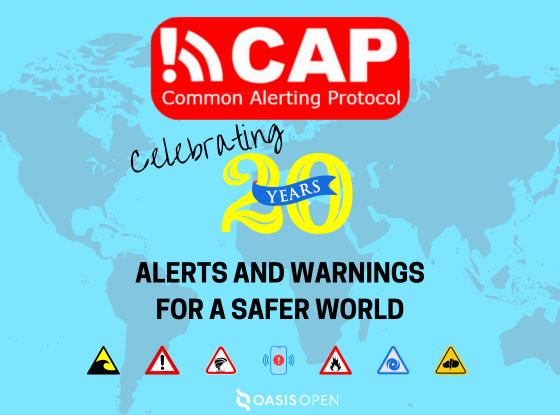
OASIS Celebrates 20th Anniversary of Common Alerting Protocol, Global Standard for Alerts and Warnings
CAP Standard Has Transformed Emergency Communication and Continues to Save Lives
Boston, MA – 7 October 2024 – This month marks the 20th anniversary of the Common Alerting Protocol (CAP) being established as an OASIS Open Standard. CAP, part of the EDXL suite of standards, provides an open, non-proprietary message format for delivering all-hazard alerts and notifications. Over the past two decades, CAP has become a model of global collaboration and a fundamental component of emergency communications systems worldwide. Its use across multiple platforms has helped save countless lives through timely, reliable messaging. Today, 87% of the world’s population lives in a country with at least one national-level CAP news feed for emergency notifications.
CAP enables a consistent message to be disseminated simultaneously over a variety of communication pathways, including radio, television, mobile phones, emails, and other media. This all-hazards, all-media format ensures that critical alerts (e.g., weather events, earthquakes, tsunami, volcanoes, public health crises, power outages, fires, child abductions, and more) reach the public swiftly and efficiently, regardless of the medium.
“As we celebrate 20 years of CAP, I’m incredibly proud that it has become the backbone of emergency communication worldwide, recognized by the UN as the standard for the Early Warnings for All program. The success of CAP is a testament to the dedication and collaboration of so many over the years, and I extend my sincere thanks to everyone who has played a part in making it the global standard it is today,” said Elysa Jones, chair of the OASIS Emergency Management Technical Committee (EMTC). “CAP’s ability to deliver consistent, interoperable alerts through multiple channels has made it indispensable for disaster management. We’ll continue to evolve CAP to ensure it serves communities in need.”
The CAP community will commemorate this significant anniversary milestone at the CAP Implementation Workshop from 22-24 October in Leuven, Belgium. OASIS is a co-sponsor of the event, which will focus on the use of CAP and its consistent use throughout the world. OASIS and the EMTC will continue to work with nations and organizations to explore future advancements in global emergency alerting.
The fundamental need for CAP was identified by the Partnership for Public Warning (PPW) in response to the 9/11 attacks when there was no consistent method for informing the nation. The 2004 Indian Ocean tsunami highlighted the urgent need for improved emergency alert communication across the globe. With the support of Eliot Christian, longtime CAP advocate and former chief architect of the World Meteorological Organization (WMO) Information System (WIS), and Elysa Jones, chair of the OASIS EMTC, along with EMTC members, CAP was officially adopted by the International Telecommunications Union (ITU) in 2007 as ITU-T Recommendation X.1303. Since then, many international organizations like the WMO, the International Federation of Red Cross and Red Crescent Societies (IFRC), and the United Nations Office for Disaster Risk Reduction (UNDRR) have embraced CAP as an essential standard for emergency alerting. In 2021, the Call to Action on Emergency Alerting set a goal to achieve 100% CAP implementation by 2025, an initiative that has since been integrated into the UN’s Early Warnings for All initiative.
OASIS and its partners are committed to increasing global CAP adoption. Participation in the EM TC is open to all through membership in OASIS, with interested parties encouraged to join and contribute to shaping the future of alerting. To get involved in the TC, visit www.oasis-open.org/join-a-tc.